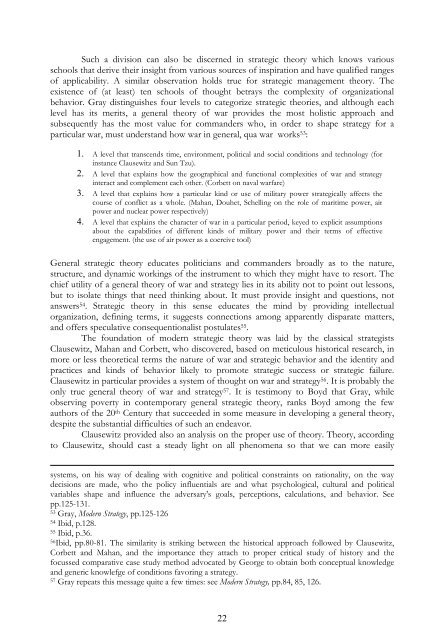Science, Strategy and War The Strategic Theory of ... - Boekje Pienter
Science, Strategy and War The Strategic Theory of ... - Boekje Pienter
Science, Strategy and War The Strategic Theory of ... - Boekje Pienter
Create successful ePaper yourself
Turn your PDF publications into a flip-book with our unique Google optimized e-Paper software.
Such a division can also be discerned in strategic theory which knows variousschools that derive their insight from various sources <strong>of</strong> inspiration <strong>and</strong> have qualified ranges<strong>of</strong> applicability. A similar observation holds true for strategic management theory. <strong>The</strong>existence <strong>of</strong> (at least) ten schools <strong>of</strong> thought betrays the complexity <strong>of</strong> organizationalbehavior. Gray distinguishes four levels to categorize strategic theories, <strong>and</strong> although eachlevel has its merits, a general theory <strong>of</strong> war provides the most holistic approach <strong>and</strong>subsequently has the most value for comm<strong>and</strong>ers who, in order to shape strategy for aparticular war, must underst<strong>and</strong> how war in general, qua war works 53 :1. A level that transcends time, environment, political <strong>and</strong> social conditions <strong>and</strong> technology (forinstance Clausewitz <strong>and</strong> Sun Tzu).2. A level that explains how the geographical <strong>and</strong> functional complexities <strong>of</strong> war <strong>and</strong> strategyinteract <strong>and</strong> complement each other. (Corbett on naval warfare)3. A level that explains how a particular kind or use <strong>of</strong> military power strategically affects thecourse <strong>of</strong> conflict as a whole. (Mahan, Douhet, Schelling on the role <strong>of</strong> maritime power, airpower <strong>and</strong> nuclear power respectively)4. A level that explains the character <strong>of</strong> war in a particular period, keyed to explicit assumptionsabout the capabilities <strong>of</strong> different kinds <strong>of</strong> military power <strong>and</strong> their terms <strong>of</strong> effectiveengagement. (the use <strong>of</strong> air power as a coercive tool)General strategic theory educates politicians <strong>and</strong> comm<strong>and</strong>ers broadly as to the nature,structure, <strong>and</strong> dynamic workings <strong>of</strong> the instrument to which they might have to resort. <strong>The</strong>chief utility <strong>of</strong> a general theory <strong>of</strong> war <strong>and</strong> strategy lies in its ability not to point out lessons,but to isolate things that need thinking about. It must provide insight <strong>and</strong> questions, notanswers 54 . <strong>Strategic</strong> theory in this sense educates the mind by providing intellectualorganization, defining terms, it suggests connections among apparently disparate matters,<strong>and</strong> <strong>of</strong>fers speculative consequentionalist postulates 55 .<strong>The</strong> foundation <strong>of</strong> modern strategic theory was laid by the classical strategistsClausewitz, Mahan <strong>and</strong> Corbett, who discovered, based on meticulous historical research, inmore or less theoretical terms the nature <strong>of</strong> war <strong>and</strong> strategic behavior <strong>and</strong> the identity <strong>and</strong>practices <strong>and</strong> kinds <strong>of</strong> behavior likely to promote strategic success or strategic failure.Clausewitz in particular provides a system <strong>of</strong> thought on war <strong>and</strong> strategy 56 . It is probably theonly true general theory <strong>of</strong> war <strong>and</strong> strategy 57 . It is testimony to Boyd that Gray, whileobserving poverty in contemporary general strategic theory, ranks Boyd among the fewauthors <strong>of</strong> the 20 th Century that succeeded in some measure in developing a general theory,despite the substantial difficulties <strong>of</strong> such an endeavor.Clausewitz provided also an analysis on the proper use <strong>of</strong> theory. <strong>The</strong>ory, accordingto Clausewitz, should cast a steady light on all phenomena so that we can more easilysystems, on his way <strong>of</strong> dealing with cognitive <strong>and</strong> political constraints on rationality, on the waydecisions are made, who the policy influentials are <strong>and</strong> what psychological, cultural <strong>and</strong> politicalvariables shape <strong>and</strong> influence the adversary's goals, perceptions, calculations, <strong>and</strong> behavior. Seepp.125-131.53 Gray, Modern <strong>Strategy</strong>, pp.125-12654 Ibid, p.128.55 Ibid, p.36.56 Ibid, pp.80-81. <strong>The</strong> similarity is striking between the historical approach followed by Clausewitz,Corbett <strong>and</strong> Mahan, <strong>and</strong> the importance they attach to proper critical study <strong>of</strong> history <strong>and</strong> thefocussed comparative case study method advocated by George to obtain both conceptual knowledge<strong>and</strong> generic knowlefge <strong>of</strong> conditions favoring a strategy.57 Gray repeats this message quite a few times: see Modern <strong>Strategy</strong>, pp.84, 85, 126.22
















